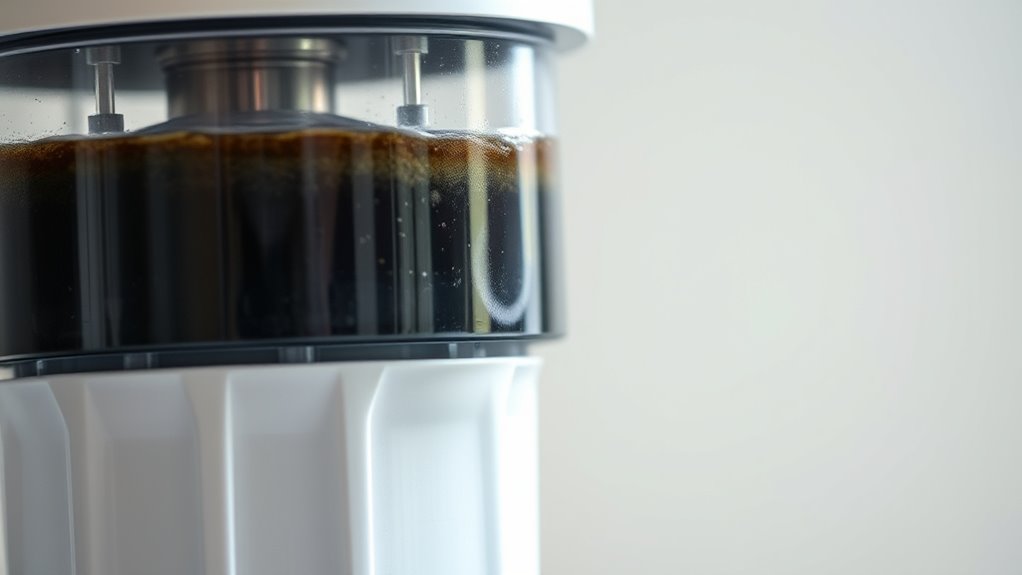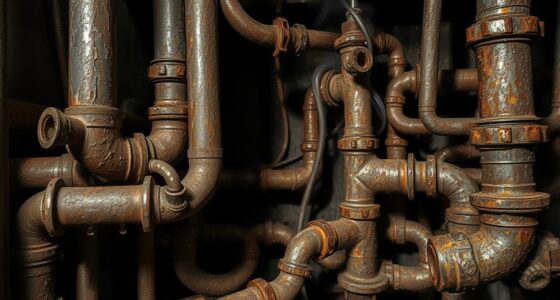If your water smells like rotten eggs after installing a filter, it’s often caused by sulfur compounds or bacteria in the water or filter media. This odor is usually temporary and should fade within a few days as the system stabilizes. To fix it, guarantee proper filter maintenance, replace filters regularly, and increase ventilation. If the smell persists, there are specific causes and solutions you can explore to keep your water fresh—more details await if you continue.
Key Takeaways
- Rotten egg smell often results from hydrogen sulfide gas or sulfur compounds in water caused by bacteria or mineral reactions.
- Initial odor after filter installation is normal but should fade within days; persistent smell indicates a need for maintenance.
- Regularly replace or clean filters every 6-12 months to prevent bacterial buildup and sulfur reactions that cause odors.
- Improve ventilation, ensure proper filter installation, and use activated carbon filters to help neutralize sulfur odors.
- Contact manufacturer support or professionals if the smell persists despite troubleshooting, to ensure safe and effective resolution.
Why Does My Water Smell Like Rotten Eggs After Installing a Filter?

If your water starts smelling like rotten eggs after installing a filter, it’s likely due to the presence of hydrogen sulfide gas. Poor water quality often causes this odor, especially if your water source contains sulfur bacteria or naturally occurring sulfates. When you install a new filter, it may disturb these bacteria or release trapped gases, resulting in the smell. To address this, check your filter’s maintenance schedule; a neglected or improperly installed filter can worsen the odor. Regularly replacing or cleaning your filter guarantees it effectively removes contaminants and reduces sulfur compounds. Keep in mind that maintaining proper water quality through consistent filter maintenance is essential to prevent the rotten egg smell from returning.
Is the Sulfur Smell Normal After Setting Up My Water Filter?
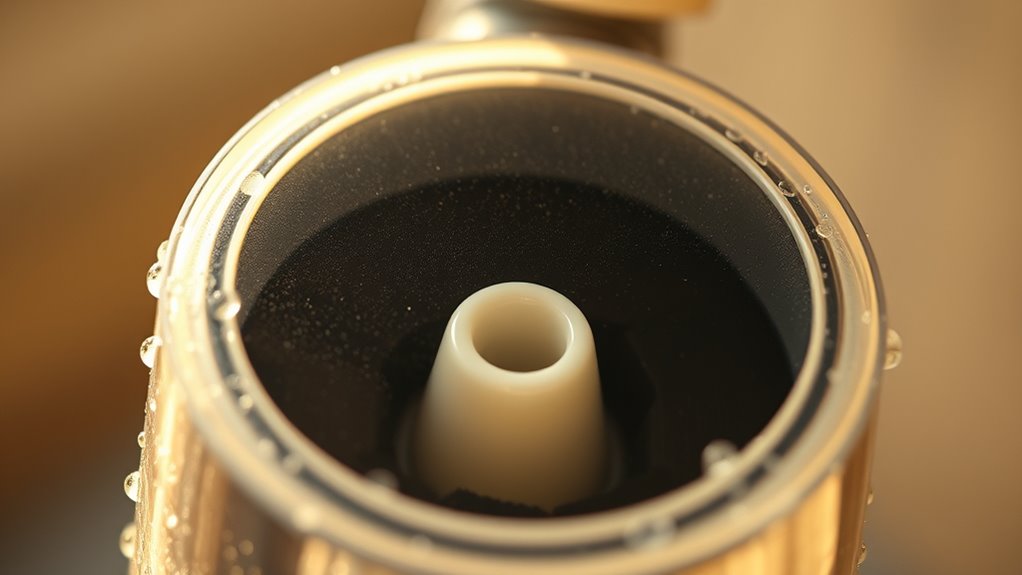
Is it normal to notice a sulfur or rotten egg smell after setting up your water filter? Yes, it can be normal initially, especially if your filter is new, as it works to improve your water quality. The smell often results from bacteria or sulfur compounds in the water reacting with the filter media. During the first few days, this odor may persist until the system stabilizes. Regular filter maintenance is essential; replacing or cleaning filters as recommended helps reduce odors and guarantees ideal performance. Keep in mind that persistent sulfur smells beyond the initial setup might indicate a need for further treatment or a different filter type. Overall, a brief sulfur smell after installation is usually normal, but ongoing issues should be addressed promptly. Additionally, understanding angel number symbolism can offer insight into positive changes and guidance during your water treatment process.
How Long Does It Take for the Rotten Egg Odor to Disappear?

The rotten egg odor can take anywhere from a few hours to a couple of days to disappear completely. Several factors, like water temperature and filter type, can influence how quickly it clears. You can also try specific tips to speed up the process and restore fresh-smelling water faster. Additionally, understanding celebrity transformations can be inspiring when tackling your own challenges in refreshing your water quality.
Timeframe for Odor Fade
Wondering how long it takes for the rotten egg smell to vanish after replacing your filter? Typically, odor removal begins immediately once you’ve installed a fresh filter and started your system. However, it can take anywhere from a few hours to a few days for the smell to completely fade. Regular filter maintenance helps speed up this process by ensuring your system runs efficiently and effectively removes odors. Keep in mind that persistent odors may require additional steps like cleaning ductwork or using odor-neutralizing products. Patience is key, as the smell gradually dissipates as your HVAC system circulates fresh air and filters out the offending particles. With consistent filter maintenance, you should notice a significant reduction in the rotten egg smell within a few days.
Factors Affecting Duration
Several factors can influence how quickly the rotten egg smell disappears after replacing your filter. Proper filter maintenance is essential; if the filter isn’t installed correctly or is clogged, the odor may linger longer. Additionally, water testing helps identify ongoing issues, such as high sulfur levels, that could prolong the smell. The quality of your water source also plays a role—more contaminated water may take longer to clear. If you’ve recently performed filter maintenance, it might take a few days for the odor to fade completely, depending on the severity of contamination. Regular testing and timely filter replacement ensure your water remains odor-free. Remember, addressing underlying water quality issues is key to speeding up the process and preventing the smell from returning.
Tips to Speed Up Process
To speed up the process of eliminating the rotten egg smell, start by ensuring your filter is installed correctly and in good condition. Proper installation helps optimize air flow, improving air quality and reducing odor faster. You can also enhance chemical reactions that neutralize sulfur compounds by increasing ventilation—open windows or use fans to circulate fresh air. Regularly replacing or cleaning your filter prevents buildup, which can prolong odor presence. Using activated carbon filters can absorb lingering gases more effectively. Additionally, incorporating air purifiers equipped with catalysts or ozone generators can accelerate odor removal by facilitating chemical reactions that break down odor molecules. These steps work together to reduce the odor more quickly, helping you restore fresh air and improve overall air quality in your space. Moreover, incorporating AI-powered air quality monitoring can help track the effectiveness of your odor elimination efforts in real time.
What Are the Main Causes of Sulfur Odor in Filtered Water?

What causes a sulfur odor in filtered water often boils down to the presence of certain bacteria or chemical reactions within your water system. These bacteria, called sulfate-reducing bacteria, thrive in low-oxygen environments and produce hydrogen sulfide gas, which smells like rotten eggs. Sometimes, chemical reactions between naturally occurring minerals and water treatment processes generate sulfur compounds. To prevent this odor, proper maintenance and regular filter changes are essential. Here’s a quick overview:
| Cause | Explanation |
|---|---|
| Bacterial Growth | Sulfate-reducing bacteria produce hydrogen sulfide. |
| Mineral Reactions | Minerals reacting during water treatment create sulfur compounds. |
| Contaminant Build-up | Accumulation in filters fosters bacteria growth. |
| Inadequate Filtration | Poor filtration allows bacteria and reactions to occur. |
Effective odor prevention hinges on addressing these causes with proper water treatment techniques. Additionally, water quality testing can help identify specific issues contributing to the sulfur smell.
How Can I Remove the Rotten Egg Smell From My Water?
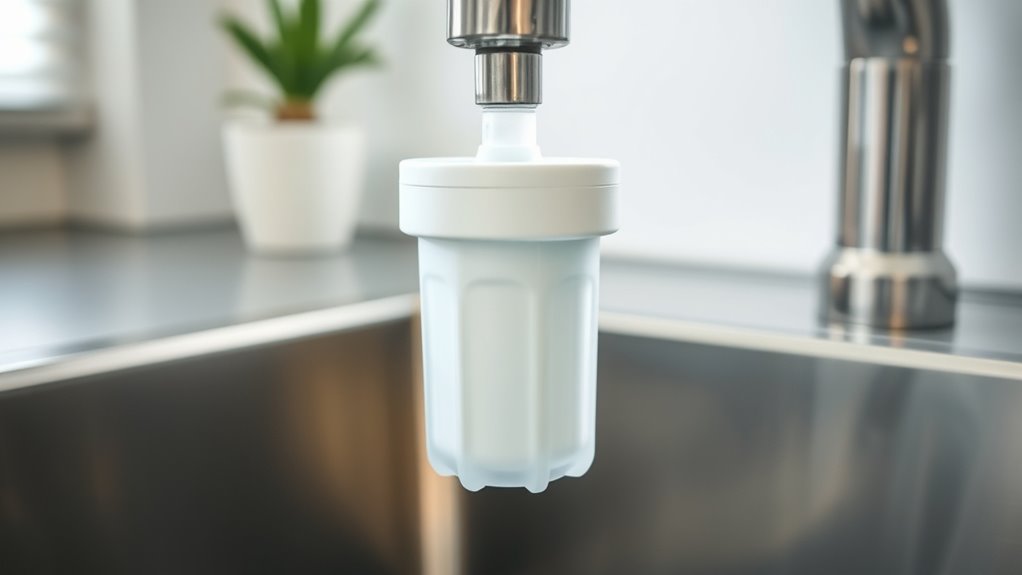
Removing the rotten egg smell from your water starts with identifying and addressing the root causes. Start by performing water testing to confirm the presence of sulfur compounds and understand their levels. Once you know what’s causing the odor, focus on filter maintenance. Regularly clean or replace your filter according to the manufacturer’s instructions to prevent buildup of bacteria or sulfur-reducing bacteria. Consider installing an activated carbon filter or a specialized sulfur filter, which can effectively remove the odor. Flushing your system periodically can also help remove trapped gases. If the smell persists after these steps, it may be necessary to treat the water with additional filtration or chemical shock treatments. HEPA filtration can also help remove airborne pollutants that may contribute to odors in the environment. Consistent water testing and diligent filter maintenance are key to keeping your water fresh and odor-free.
Are There Any Precautions I Should Take During Troubleshooting?

When troubleshooting the rotten egg smell in your water, it’s important to prioritize safety to prevent injury or damage. Always follow precautionary measures and safety guidelines to protect yourself and your property. Turn off the water supply before inspecting or working on your filter to avoid leaks or water damage. Wear gloves and eye protection if you’re handling chemicals or cleaning components. Ensure proper ventilation, especially if you’re using cleaning agents or dealing with sulfur odors. Keep electrical tools away from water sources to prevent shocks. If you’re unsure about any step, consult your manufacturer’s instructions or a professional. Additionally, understanding the causes of sulfur odors can help you identify the source more accurately. Taking these safety precautions helps you troubleshoot effectively while minimizing risks. Remember, being cautious ensures a safer, smoother process.
When Should I Replace My Water Filter to Prevent Odors?
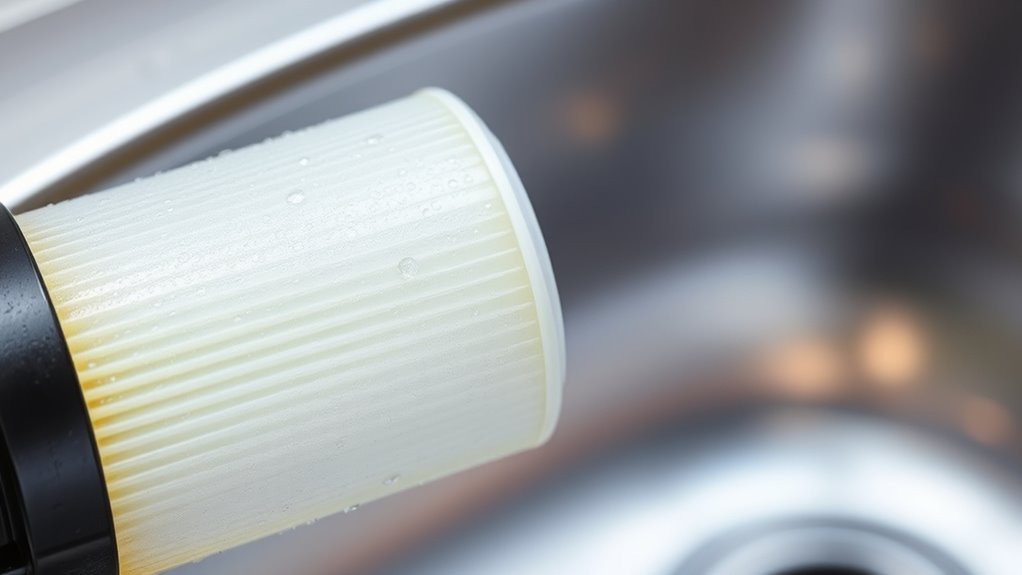
To prevent odors like the rotten egg smell from developing, it’s essential to replace your water filter before it becomes heavily saturated with contaminants. Typically, filters should be changed every 6 to 12 months, depending on your water quality and usage. Regular filter maintenance ensures your system continues to effectively remove sulfur, bacteria, and other impurities that cause odors. Pay attention to any decrease in water flow or changes in taste and smell, as these signals indicate it’s time for a replacement. Keeping up with scheduled filter changes maintains ideal water quality and prevents the buildup of substances that lead to unpleasant odors. Filter lifespan is a key factor in maintaining fresh, clean-tasting water and avoiding issues caused by a saturated filter. Remember, timely filter replacement is key to maintaining fresh, clean-tasting water and avoiding issues caused by a saturated filter.
Who Can I Contact if the Problem Persists After Troubleshooting?

If troubleshooting your water filter doesn’t resolve the rotten egg smell, it’s important to seek professional help. Contact the manufacturer’s customer support for guidance—they can provide specific advice based on your filter model and situation. If your filter is still under warranty, you might be eligible for warranty claims, which could include a replacement or repair at no extra cost. Be prepared to share details like purchase date, model number, and your troubleshooting efforts. Customer support teams are trained to help diagnose persistent problems and advise on next steps. If they determine your filter needs replacing or repair, they’ll guide you through the warranty process. Additionally, filter maintenance practices can sometimes prevent ongoing issues. Don’t hesitate to reach out—they’re there to help you maintain clean, odor-free water.
Frequently Asked Questions
Can the Rotten Egg Smell Indicate a Bigger Plumbing Issue?
Yes, the rotten egg smell can indicate a bigger plumbing issue, like plumbing leaks or high water hardness. If you notice this odor, check for leaks around your pipes or fixtures, as leaks can cause bacteria buildup that produces sulfur smells. Additionally, hard water can lead to mineral deposits, which may contribute to the odor. Addressing plumbing leaks and testing water hardness can help eliminate the smell and prevent future problems.
Are Certain Water Sources More Prone to Sulfur Odors?
They say “know your enemy,” and that’s true for sulfur odors. Certain source water is more prone to sulfur smells due to higher mineral content, especially from well water or groundwater sources. These minerals, like sulfur, react with bacteria, causing the rotten egg smell. If your source water has high mineral levels, you’re more likely to notice sulfur odors. Regular testing and proper filtration can help manage this issue effectively.
Does the Type of Filter Affect Odor Removal Effectiveness?
Yes, the type of filter greatly affects odor removal effectiveness. You should look for filters with specific filter material designed for odor absorption, such as activated carbon or catalytic carbon. These materials effectively trap sulfur compounds responsible for the rotten egg smell. Choosing a filter with the right material ensures better odor control, so you can enjoy cleaner, fresher water without the unpleasant sulfur smell.
Can Using Additional Filtration Systems Eliminate the Smell?
Yes, using additional filtration systems can help eliminate the rotten egg smell. These systems enhance odor mitigation by incorporating advanced filtration technology, such as activated carbon filters or specialized air purifiers. By layering filters, you improve the overall effectiveness in removing sulfur compounds responsible for the smell. This approach guarantees cleaner, fresher air, especially if your current filter isn’t fully addressing the odor issue.
Is the Rotten Egg Smell Harmful to Health?
The rotten egg smell can be harmful to your health because it indicates the presence of hydrogen sulfide gas, which may cause nausea or headaches with prolonged exposure. Poor water quality and inadequate odor prevention can worsen the smell. To protect yourself, address the source of the odor, improve filtration, and guarantee your water supply is thoroughly tested and treated, reducing health risks and improving water quality.
Conclusion
If you notice a rotten egg smell after installing a water filter, don’t panic—most issues are fixable. About 75% of sulfur odors come from bacteria or filter buildup, which you can usually address with proper maintenance. Regularly replacing your filter every 6 to 12 months can prevent odors and ensure clean water. If problems persist, contact a professional to keep your water safe and fresh.
